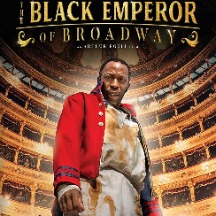Within the first eight minutes of “The Black Emperor of Broadway,” I was moved from critiquing every frame of the film to embracing the story. The show opens with us catching the lead character, Shaun Parkes as Charles Gilpin, expressing anger for having to put on blackface to do his job as a performer.
Gilpin eventually became the first Black to play the lead in a Broadway show, and in natural face, in “The Emperor Jones.” Eugene O'Neill, son of Irish immigrants, wrote “The Emperor Jones,” which ran on Broadway in 1920.
O’Neil’s play is about Brutus Jones, an African American and a former Pullman porter, who kills another Black man in a dice game, is jailed, and later escapes to a small, Caribbean island where he sets himself up as emperor. The play was also a first for O'Neill, it was his first big box-office hit.
Also, in the film, the character playing the now famous Paul Robeson initially turned down the role, calling it a "monstrosity." This underscored the controversy of the play and how even the most to–become ardent Black icons, Paul Robeson and Ossie Davis, learned to manage this minefield as well. But, why do we remember Robeson and Davis, but not Charles Gilpin?
The film’s eight-minute opening is a cheap-shot since it seems as if director Arthur Egeli wants to provoke anger when in reality many of us put on modern forms of blackface every day. And, since we have learned to manage it so well, what are the chances of having someone catch us in our moment of anger, as he did with Gilpin?
As the camera rolled, Gilpin displayed a shell of Black people that his 1920 White audience wanted and my mind floated forward to 2020 Black Baltimore and Republican congressional candidate Kimberly Klacik and her performances showcasing, without depth, the problems in Black America.
I Got Me a Part in a Broadway Show - The Story of Broadway’s First Black Lead
Entertainment




As in life, much of the tension between O’Neil and Gilpin was the actor’s objection to the use of the word "nigger" im O’Neil’s creation. Gilpin even began substituting the word with "Negro" in the premiere. Sadly, the same argument continues 100 years later. While watching the the power O'Neil displayed, I grew a much greater appreciation for Black play and screenwriters and producers.
In the film, a White actor tries to exercise his privilege and wants to perform a role in black face, in a time when "blackface" was the norm on stage. Also, in the film, the character playing the now famous Paul Robeson initially turned down the emperor role, calling it a “monstrosity.” Port Of Harlem could not confirm the accuracy of that portion, but Robeson later starred in the O'Neill play on stage, a role that had helped launch his career, and in the 1933 film.
Ossie Davis starred in a television adaptation for the Kraft Television Theatre in 1955. This underscored the controversy of the play and how even the most to-become ardent Black icons learned to manage this minefield as well.
But, why do we remember Robeson and Davis, but not Gilpin? Maybe this excellent movie, that got me much more thoughtfully involved in the story than I initially expected, will correct this oversight. Supporting actors John Hensley as O’Neil, Nija Okoro as Florence, Gilpin’s wife, and Nick Moran as Jasper Deeter, who is credited with convincing the playwright to cast Gilpin, superbly added dimensions to Gilpin’s struggles and historical achievements - - and maybe Gilpin’s place in history.
Note: The 98-minute film is available on Video on Demand (VOD) platforms including iTunes, Vudu, Google Play, Xbox, Amazon, and FandangoNow, as well as cable affiliates, and October 6, on DVD from major online retailers.
In the film, a White actor tries to exercise his privilege and wants to perform a role in black face, in a time when "blackface" was the norm on stage. Also, in the film, the character playing the now famous Paul Robeson initially turned down the emperor role, calling it a “monstrosity.” Port Of Harlem could not confirm the accuracy of that portion, but Robeson later starred in the O'Neill play on stage, a role that had helped launch his career, and in the 1933 film.
Ossie Davis starred in a television adaptation for the Kraft Television Theatre in 1955. This underscored the controversy of the play and how even the most to-become ardent Black icons learned to manage this minefield as well.
But, why do we remember Robeson and Davis, but not Gilpin? Maybe this excellent movie, that got me much more thoughtfully involved in the story than I initially expected, will correct this oversight. Supporting actors John Hensley as O’Neil, Nija Okoro as Florence, Gilpin’s wife, and Nick Moran as Jasper Deeter, who is credited with convincing the playwright to cast Gilpin, superbly added dimensions to Gilpin’s struggles and historical achievements - - and maybe Gilpin’s place in history.
Note: The 98-minute film is available on Video on Demand (VOD) platforms including iTunes, Vudu, Google Play, Xbox, Amazon, and FandangoNow, as well as cable affiliates, and October 6, on DVD from major online retailers.
Advertisers | Contact Us | Events | Links | Media Kit | Our Company | Payments Pier
Press Room | Print Cover Stories Archives | Electronic Issues and Talk Radio Archives | Writer's Guidelines






